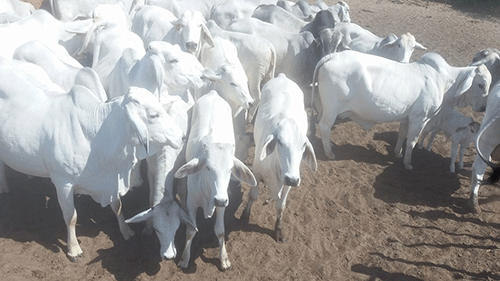The white Brahman has been a wonder of farming for years, with many farmers excitedly breeding it in their herds for several reasons.
Those who farm with it speak highly of its beauty, high meat quality and calving rate.
It is, therefore, no surprise that the white Brahman, or the Brahman to be exact, is one of the most reared breeds in Namibia.
For young farmer Alba Marenga, farming with the white Brahman was not even a matter of choice. It was what defined him as a farmer, he said, having grown into white Brahman farming.
Marenga farms at Otjovakuatjiti in the Eiseb area of the Omaheke region, a place he has called home all his life. He is the son of former councillor for Otjombinde constituency Karii Marenga.
It was from his father, he said, that he learned the delicate art of livestock stud farming, which is the hallmark of Karima Brahman Stud.
The elder Marenga has been an ardent farmer of the white Brahman for many years, something that seems to have rubbed off on his son, Alba.
The younger Marenga has, however, managed to create his niche in the Brahman farming circles, and he does not plan to stop any time soon.
“I was born into farming. Some people would say they started farming some years ago, but I was born into it. From the moment, I could comprehend things, farming is all I could remember,” he said.
It was, however, only in 2020 that Marenga decided to take his farming to a higher level when he left the vocational studies he was doing at the time and returned to Otjovakwatjivi to pursue full-time farming.
“My father needed someone to take over operations; someone more energetic and young, and he has run the course. I opted to be that person and have not looked back since,” said Marenga.
His typical day at the cattle post includes attending to the upkeep of the infrastructure at the cattle post, such as fences and kraals.
Rearing both stud and commercial animals is hard work, he says, but it equally gives him great joy.
He said farming has been a conscious decision the family took, as it considers commercial farming to be the backbone of stud farming.
“You can never go into stud farming without having some commercial livestock on the side to keep you going. Stud farming is a lucrative enterprise, but one that takes a long time before it starts yielding results. Therefore, you gotta have a backup plan to keep you going in the interim,” said Marenga.
Marenga said the family started with normal commercial cows which they have over time introduced stud bulls for better quality animals.
As such, the family has over the years managed to improve the pedigree and quality of the animals it keeps, which eventually led to the establishment and registration of Karima Brahman.
Marenga’s prime farming business is the breeding and selling off of young bulls – both stud and commercial – to other farmers. The female calves and heifers are also sold, but only as a package of about seven or 10, he said.
“We are not really in the business of selling heifers – but now and then, we do if there are willing farmers prepared to buy at a feasible price. It is the bulls that we are after, as we believe a quality bull is important for every herd.
Marenga said despite the ever-present poisonous plants and predators in the area, he has adapted to farming amidst all these challenges.
“At times, you would see leopards, hyenas and wild dogs roaming the area and you would be praying that they don’t touch your livestock. But when it happens, we accept it and move on. Just last week, one of my calves was attacked by a pack of wild dogs and was badly injured. We had to put it down, but each day we rise and move forward,” he said.
tjatindi@gmail.com


